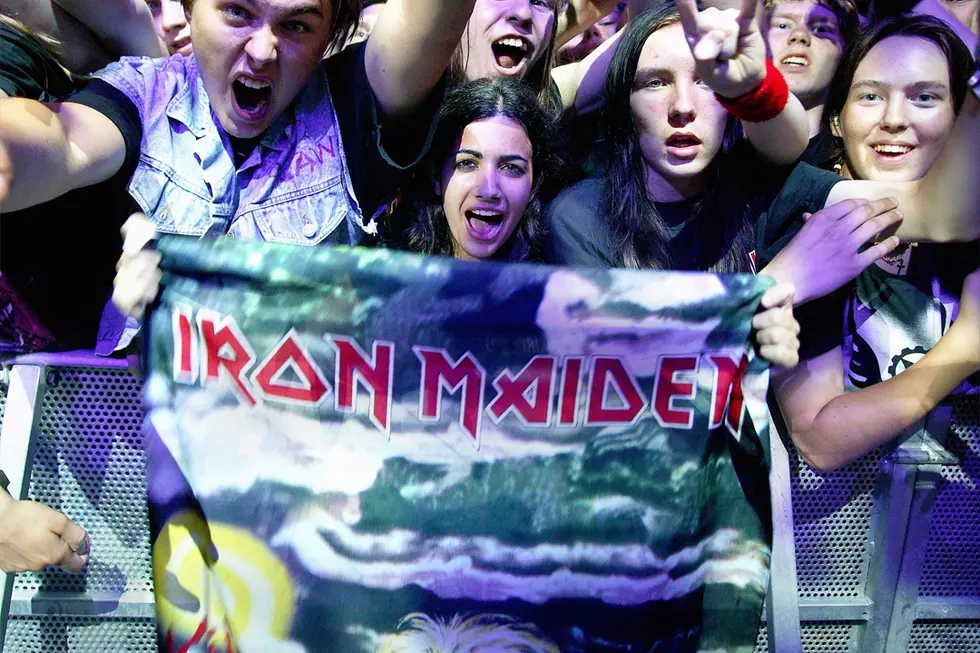
How a Holiday Revelation Led to the Birth of Iron Maiden
A frustrated young bassist named Steve Harris decided on Christmas Day 1975 that he'd never be creatively satisfied unless he started his own band. The rest was heavy-metal history.
Harris was in a group called Smiler at this point, but he was finding it impossible to convince his bandmates to perform his original material.
"I was listening to things like early Genesis, which I really love, and Jethro Tull, Pink Floyd, King Crimson, Yes, Black Sabbath, Deep Purple and Led Zeppelin," Harris told Guitar World. "So when I started writing my own stuff, it was with a lot of combinations and time changes and power.
"I wanted to do my first real song with Smiler, but when I brought it to them they said, 'Oh shit, this has too many time changes. We're not bloody doing this,'" Harris added. "I couldn't handle that attitude, so I left and formed Iron Maiden."
As any true fan of the now-legendary British metal band is aware, it wasn't quite as easy as Harris simply going out and starting Iron Maiden. The group went through quite a few lineup changes in its early days, and many of their early exploits have been lost in the haze of history: In fact, according to the Neil Daniels book Killers: The Origins of Iron Maiden, 1975-1983, it's possible (if not likely) that Iron Maiden started coming together in the weeks and months prior to Harris' official founding date.
If the exact details remain up for debate, certain facts surrounding Iron Maiden's birth are indisputable — such as Harris being inspired to name his new band after sitting through a screening of director James Whale's The Man in the Iron Mask. The 1939 film was a loose adaptation of Alexandre Dumas' novel Le Vicomte de Bragelonne ou Dix ans plus tard, which riffed on the French legend that imagined Louis XIV imprisoning his kindhearted twin brother in a mask so tight that his beard will eventually suffocate him.
Their imposing Iron Maiden moniker proved a similarly snug fit for the prog-injected brand of aggressive rock that Harris was busy writing. If the group's chemistry took some time to develop, that's just a consequence of seeking perfection — and, as Harris later admitted, tracking down people who were compatible on more than a musical level.
"It was all about finding the right players — but not just the right players, but the right people," he said. "When you find the right lineup that works, it's really exciting. You have to be dedicated, and sometimes you want to put your head through the walls. Everyone goes though that period, I think."
This period lasted several years for Iron Maiden, as a number of band members exited — including vocalist Paul Di'Anno, who handled the vocals for the group's first two LPs. By late 1981, they'd cemented the lineup that would catapult Harris' dream to multi-platinum glory, with guitarist Adrian Smith coming aboard in 1980 and singer Bruce Dickinson joining the following year.
Decades later, Iron Maiden was still going strong, as evidenced by the critical and commercial success of albums like 2021's Senjutsu. All along, according to Harris, they've marched steadily to the beat of their own drum.
"We’ve always done what we wanted to do, right from the first album," he told Goldmine. "We’re not trying specifically to be like anything other than just writing what the songs we feel are right at the time. You know, we never really know what we’re going to write next – which is part of the excitement when we go in and do a new album. No battle plan, we just go in and do it and what comes out, comes out."
Top 10 Reunion Tours
Iron Maiden's Rarest Songs
More From Classic Rock Q107










